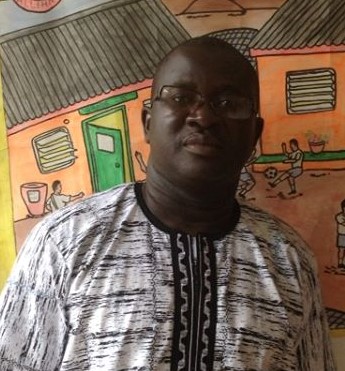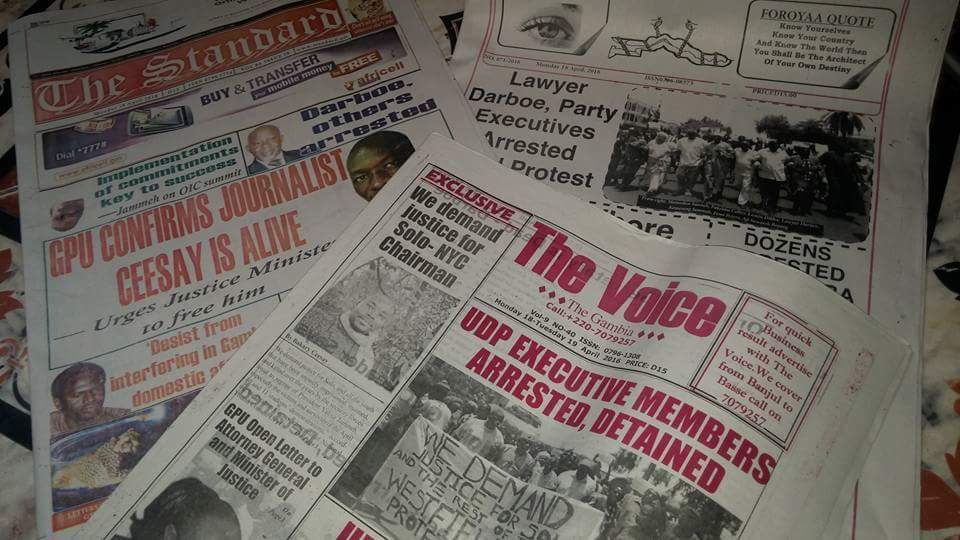
Free Press: The basic benchmark for determining whether a country is truly democratic or not
On the 2nd December 2016, we made a tryst with destiny, a watershed in our chequered political history, a break with an unforgettable past that saw the meteoric climb of tyranny, brutality and dictatorship to their nadir or lowest water marks, a god-sent salvation from the cruel fangs of dictatorship.
To the media professionals who have dared to have the courage of their conviction and pen, the road to this stage has been bumpy, precipitous and paved with sharp-edged stones. From a Kenneth Best deportation to the arrest and detention of journalists on trump-up charges to the near fatal attack on the lives of journalists to the never-ending arson attacks on media houses.
The dastardly and cowardly attack that so tragically claimed the life of the genial Uncle Deyda Hydara and the callous murder of other journalists remain the “unkindest cut of all”. The catalogue of miseries and misfortune and the dirges of sorrow that the Press sang, very audibly and sonorous, was heartrending. It was by design labelled as Public Enemy Number One of the Government. Journalists were variously referred to as “traitors”, “foreign agents”, “saboteurs”, et al. Thus, for 22 years, the Press saw itself manacled, blindfolded and gagged. Appalling deeds were committed against its independence, appalling suffering and provocation endured.
However, while the Government of yore was the worst enemy of the Press, there were chorus of hostility which came from the direction of some of us citizens. The commonest argument publicly advanced by some Gambians was that press freedom is an exorbitant luxury that we cannot purchase; that a free press easily leads to the inability of the government to function and to internal chaos. That the task of nation-building, creating confidence in our leaders and institutions or getting a government policy up and running cannot be left to the caprices of journalists and reporters since such directives or policies transcend any idea of individual independence. Thus, even individuals, unfortunately, thought that a free press can subvert public order.
Fast forward to 2017, we are enjoying a freedom never seen in the annals of our country. Dictatorship has been banished to the land yonder; freedom is ringing in every nook and cranny. The new Government has promised to put media freedom high on its agenda. The present environment is encouraging. The indispensable role of the press is graphically clear to the Government.
At this juncture of our political evolution, we need a robust press which can bring about or promote national reconciliation by encouraging the discussion of controversial matters of national concern before they reach the flashpoint. Since the press only mirrors the prevailing opinions, the undercurrent of discontent and other cross-current of views, it can serve as the very catharsis of discontent and an antidote to violence.
A press capable of and able to report and reflect popular discontent with the direction of national policy or even with the government of the day, can serve as an important safety valve or warning light, identifying issues and problems that urgently demand solution or discussion if political advancement, stability and pluralism are to be maintained. Thus, a free press is an effective forum for public debates, a mechanism that facilitates an invaluable two-way communication between the people and their elected leaders.
The breath and latitude given to the press is a pointer to the ‘openness’ or ‘closeness’ of any government. The press should have the freedom to assess actual risk, criticise government policy and make intelligible criticisms. Accountability and transparency, if they are not to become merely sugar-coated claptraps, ought to be given the chance to blow away the cobwebs in the cloistered recessed of our State House. Galling truth must not be stifled.
Openness should be mandatory and not discretionary. And since democracy strives in soils where people fearlessly, freely and faithfully express their views to further the exchange of opinions and the enlightenment of the public, the repealing of the unreasonable media laws should be expedited and a Right to Information Act promulgated. A free press thus serve as a catalyst for democratic change, the vigilant conscience-keeper of the nation, the unflagging watchdog of the citizenry.
A prerequisite for democracy to flourish and blossom is when the citizens have the moral duty to criticize and scrutinise both the motives and character of governmental acts of commission and omission. However, it is a fact that words are often the triggers of action, and an ‘irresponsible’ press can ignite a conflagration, there is the urgent need for the media, represented by the Gambia Press Union, to put in place regulatory framework for responsible journalism and in partnership with the Government a media regulatory body which would be responsible for the disciplining of ‘arrant’ practitioners or those who engage in unethical behaviours.
Media Houses must invest in the professional development of their staff. This should be a higher priority. The progress of every media house is inextricably linked to the professional development of its staff and, by extension, to the growth of a responsible, free media. Focusing solely on profit is inimical to the growth of a responsible press. In the book “New Times, Making A Professional Newspaper in an Emerging Democracy” Tatiana Repkova writes: “An independent newspaper (media) is an honest broker for information for its readers without deliberate bias or favouritism…….An independent newspaper (media) does not base its professional decisions on the narrow economic or political interests of any single entity, including itself.”
Every media practitioner must also exercise a certain degree of individual responsibility in the way and manner he or she disseminate information to a largely unsuspecting, uncritical population that swallows often at first value the information it receives. ‘Do no harm’ and ‘verify first’ should be cardinal principles to observe. While balancing the public’s right to know and people’s rights to privacy and dignity could be like skating on thin ice, a media practitioners who is ethical and observes ethical principles will be able to maintain the balance.
Every other citizen must be an ardent supporter of a free press. For far too long we have left the struggle for respect for human rights and freedom in the hands of media practitioners only. Theirs is not alone to safeguard. When the right of a media practitioner is threatened or violated, the whole society should rise to the rescue. When a state wants to become dictatorial it first shuts down the media. Then the existence of the whole society is threatened.
Whatever happens, I am doubly optimistic that New Gambia will create that environment where the media will play a central role in our quest to attain full democracy, to proudly accomplish the dreams of the future and of New Gambia. The prognosis is encouraging.
Viva Gambia….A luta continua
By Njundu Drammeh





